By Jennifer Slagus and Callie Hammond There is something endlessly energizing about reading new things—whether it’s an anxiously-awaited release, a long-term tenant on your TBR-list, or the research of an emerging scholar (maybe we’re a little biased on that last one). Members of the CLA Student Committee are privileged to do just that: to read exciting books and write about all the exciting ways they can be used in classrooms to improve the lives and learning of our students. Much of our work as early career researchers highlights critical pieces of children’s literature that attend to the social, cultural, and political contexts of our real and literary worlds. We want to share a few recently published, award-winning books relevant to our doctoral research that highlight young peoples’ bravery and acts of resistance. All three are critical, impactful reads worth embedding in each of our classrooms in 2024. Jennifer Slagus I’m a huge fan of books by authors who share a lived reality with their characters. As a neurodivergent researcher, I strive to highlight middle grade novels that help to restory the perceptions of who neurodivergent people are (and who they’re allowed to be). There have been many fabulous authors in the past five years or so who have contributed books that do just that. But one author sticks out to me as an exceptional advocate for neurodivergent acceptance: Sally J. Pla. She’s an autistic middle grade author and the founder of A Novel Mind, a website that centers mental health and neurodiversity representation in children’s fiction. ANM has been a gold mine for my research. Not only does it feature a vibrant blog and a ton of educator resources, but it also has a database of over 1,150 children’s books featuring mental health and neurodiversity representation.
Callie Hammond As a middle school teacher for ten years, I often utilized picturebooks to engage my students and to teach discrete skills, usually about grammar, and to illustrate writing techniques. These lessons had varying success—sometimes the 7th graders would be open to reading a picturebook, other times they rolled their eyes and refused to participate. The most successful picturebooks that I ever brought into my classroom though had nothing to do with grammar or writing, they had to do with Anne Frank. I taught her diary to 6th graders who, unless they were readers themselves and had already discovered World War II fiction, had no knowledge of the Holocaust or how Jews were treated in the years preceding the war. My Anne Frank picturebook collection featured many books about Anne (there are a lot of them out there), but also books that explained significant parts of the war: the night of broken glass, Jewish resistance, children in concentration camps, children who also hid during the war, and many others. Now, as a doctoral student in English education, I have come full circle to analyze the stories of Jewish female protagonists in YA novels about World War II, and representations of the Holocaust in picturebooks. Two of these picturebooks were published in 2023 and feature stories and information that our students need and can learn from. Both books were also just named Notable Books for a Global Society Award for 2024. As is fitting for a book about a traumatic historical event, both are nonfiction and have extensive back matter to explain the stories. Utilizing both of these picturebooks in the classroom with older students can prep them for the heavier history or readings a teacher might soon introduce. They also provide picture evidence of hardships and bravery without being too macabre. Jennifer Slagus is a doctoral candidate at Brock University in Ontario, Canada and Coordinator of Research & Instruction at the University of South Florida Libraries. Jennifer’s doctoral research focuses on representations of neurodivergence in twenty-first century middle grade fiction. Callie Hammond is a doctoral student at North Carolina State University in Raleigh, North Carolina. Callie’s doctoral research focuses on accessing historical knowledge when teaching literature that involves the Holocaust and using critical content analysis to analyze and understand representations of the Holocaust in children’s picturebooks. CLA Student Committee Members
By Erika Thulin Dawes and Xenia Hadjioannou on behalf of the Biography Clearinghouse 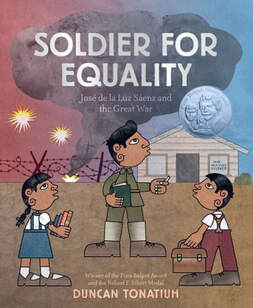 We close out the school year immersed in social strife and conflict. Our students are grappling both with big questions about humanity and substantial uncertainties about everyday life. Recent research describes rising mental health concerns for young people (Acheson, 2020; Cowie & Myers, 2021; Samji et al. 2022) and it’s not surprising that maintaining optimism is challenging in the context of war, a global pandemic, and climate change. As educators, we are seeking ways to provide our students with grounding and with hope. And we believe that biographies, life stories of inspiring people, can help to provide both an anchor and inspiration. Our latest Biography Clearinghouse entry features Duncan Tonatiuh’s picturebook biography Soldier for Equality: José de la Luz Sáenz and the Great War. Using his trademark illustrative style, digital collage inspired by Mixtec Pre-Columbian art, Tonatiuh describes the World War I experiences of ‘Luz’; a teacher, activist, Texan, and a person with Mexican heritage. Toniatiuh’s biography of José de la Luz Sáenz is a powerful narrative of the transformative power of literacy. Luz’s education and multilingualism were instrumental in his life trajectory; his knowledge allowed him to navigate the battlefield safely, keeping him out of the trenches and instead in a fortified command post for the intelligence service. He developed his skills in organizing while teaching English to Mexican American soldiers. And upon his return to teaching when the war was over, he turned his outrage over unequal schooling for Mexican American children into activism, establishing the League of United Latin American Citizens (LULAC), an organization that helped to end the segregation of Latinx children from white schools. In our Biography Clearinghouse entry, we provide an interview with Duncan Tonatiuh and a collection of teaching ideas to support student exploration of Soldier for Equality. These teaching ideas encourage students to consider the transformative power of literacy and the generative power of community organizing and activism. They include: an exploration of translanguaging and theme development in picturebooks; a history of and contemporary look at the experience of minoritized populations in the United States army; a call to allyship to counter bullying; a visual literacy exercise exploring traditional artistic motifs; and a tribute to teacher activists. Below is an excerpt of the teaching ideas in the Biography Clearinghouse entry for Soldier for Equality: José de la Luz Sáenz and the Great War:
Teachers as Activists
Citations Acheson, R. (2020). Research digest: The impact of the covid-19 pandemic on child, adolescent, young adult, and family mental health. Journal of Child Psychotherapy, 46(3), 429-440. https://doi.org/10.1080/0075417X.2021.1912810 Cowie, H., & Myers, C. (2021). The impact of the COVID‐19 pandemic on the mental health and well‐being of children and young people. Children & Society, 35(1), 62-74. https://doi.org/10.1111/chso.12430 Samji, H., Wu, J., Ladak, A., Vossen, C., Stewart, E., Dove, N., Long, D., & Snell, G. (2022). Review: Mental health impacts of the COVID‐19 pandemic on children and youth – a systematic review. Child and Adolescent Mental Health, 27(2), 173-189. https://doi.org/10.1111/camh.12501 Erika Thulin Dawes is a Professor of Language and Literacy at Lesley University where she teaches courses in children’s literature and early childhood literacy and is the program director of the graduate Early Childhood Education program. Erika is a former chair of NCTE’s Charlotte Huck Award for Outstanding Fiction for Children. Xenia Hadjioannou is an Associate Professor of Language and Literacy Education at the Harrisburg campus of Penn State University where she teaches and works with pre- and in-service teachers through various courses in language and literacy methodology. She is the Vice President and Website Manager of the Children's Literature Assembly, and a co-editor of The CLA Blog. The Bonnie Campbell Hill National Literacy Leader Award
|
If you have 1-2 hours . . . |
If you have 1-2 days . . . |
If you have 1-2 weeks . . . |
No matter the time period being studied - historical or contemporary - the close examination of artifacts involves honing keen observational and critical thinking skills. Teachers can present students with a selection of objects or parts of objects and invite them to examine them to see what stories they reveal. As an extension activity, students can bring their own artifacts from home, adding to the archaeological analysis. |
Invite students to learn enough about an artifact (and its discoverer) to create a museum exhibit about the artifact. (Julio C. Tello may have done this for his found artifacts.) Use the Smithsonian Learning Lab Museum Descriptions as mentor texts to help students discover what they may want to include in a museum description of their own. |
Combine archeological museum exhibits to make a museum for learning in your school community. Invite other classes, parents, and the larger community. Create an archeological museum of the “future.” Invite students to pretend they are 500 years in the future and challenge them to create a museum showcasing archeological artifacts that showcase school life in the 2020s. This will invite them to think deeply and use the skills and strategies of an archeologist. Which artifacts in their classroom may survive for that long? How could you write about these artifacts to describe them for someone who does not recognize them? Create museum exhibits and a museum. Invite outside learners. |
Julie Waugh shares a 4th grade teaching position at Zaharis Elementary in Mesa, AZ and serves as an Inquiry Coach for Mesa Public Schools. She delights in the company of children surrounded and inspired by books. A longtime member of NCTE, and an enthusiastic newer member of CLA, Julie is a former committee member of NCTE's Orbis Pictus Award for Outstanding Nonfiction for Children.
Authors:
CLA Members
Supporting PreK-12 and university teachers as they share children’s literature with their students in all classroom contexts.
The opinions and ideas posted in the individual entries are those of the individual authors and do not necessarily reflect the opinions or views of CLA or the Blog Editors.
Blog Editors
contribute to the blog
If you are a current CLA member and you would like to contribute a post to the CLA Blog, please read the Instructions to Authors and email co-editor Liz Thackeray Nelson with your idea.
Archives
May 2024
April 2024
March 2024
February 2024
January 2024
December 2023
November 2023
October 2023
September 2023
August 2023
May 2023
April 2023
March 2023
December 2022
November 2022
October 2022
September 2022
August 2022
June 2022
May 2022
April 2022
March 2022
February 2022
January 2022
December 2021
November 2021
October 2021
September 2021
August 2021
June 2021
May 2021
April 2021
March 2021
February 2021
January 2021
December 2020
November 2020
October 2020
September 2020
August 2020
June 2020
May 2020
April 2020
March 2020
Categories
All
Activism
Advocacy
African American Literature
Agency
All Grades
American Indian
Antiracism
Art
Asian American
Authors
Award Books
Awards
Back To School
Barbara Kiefer
Biography
Black Culture
Black Freedom Movement
Bonnie Campbell Hill Award
Book Bans
Book Challenges
Book Discussion Guides
Censorship
Chapter Books
Children's Literature
Civil Rights Movement
CLA Auction
CLA Breakfast
CLA Expert Class
Classroom Ideas
Collaboration
Comprehension Strategies
Contemporary Realistic Fiction
COVID
Creativity
Creativity Sponsors
Critical Literacy
Crossover Literature
Cultural Relevance
Culture
Current Events
Digital Literacy
Disciplinary Literacy
Distance Learning
Diverse Books
Diversity
Early Chapter Books
Emergent Bilinguals
Endowment
Family Literacy
First Week Books
First Week Of School
Garden
Global Children’s And Adolescent Literature
Global Children’s And Adolescent Literature
Global Literature
Graduate
Graduate School
Graphic Novel
High School
Historical Fiction
Holocaust
Identity
Illustrators
Indigenous
Indigenous Stories
Innovators
Intercultural Understanding
Intermediate Grades
International Children's Literature
Journal Of Children's Literature
Language Arts
Language Learners
LCBTQ+ Books
Librarians
Literacy Leadership
#MeToo Movement
Middle Grade Literature
Middle Grades
Middle School
Mindfulness
Multiliteracies
Museum
Native Americans
Nature
NCBLA List
NCTE
NCTE 2023
Neurodiversity
Nonfiction Books
Notables
Nurturing Lifelong Readers
Outside
#OwnVoices
Picturebooks
Picture Books
Poetic Picturebooks
Poetry
Preschool
Primary Grades
Primary Sources
Professional Resources
Reading Engagement
Research
Science
Science Fiction
Self-selected Texts
Small Publishers And Imprints
Social Justice
Social Media
Social Studies
Sports Books
STEAM
STEM
Storytelling
Summer Camps
Summer Programs
Teacher
Teaching Reading
Teaching Resources
Teaching Writing
Text Sets
The Arts
Tradition
Translanguaging
Trauma
Tribute
Ukraine
Undergraduate
Using Technology
Verse Novels
Virtual Library
Vivian Yenika-Agbaw Student Conference Grant
Vocabulary
War
#WeNeedDiverseBooks
YA Lit
Young Adult Literature

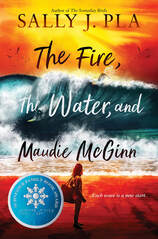
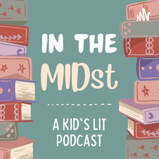
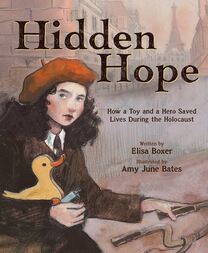
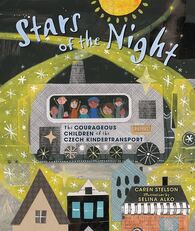

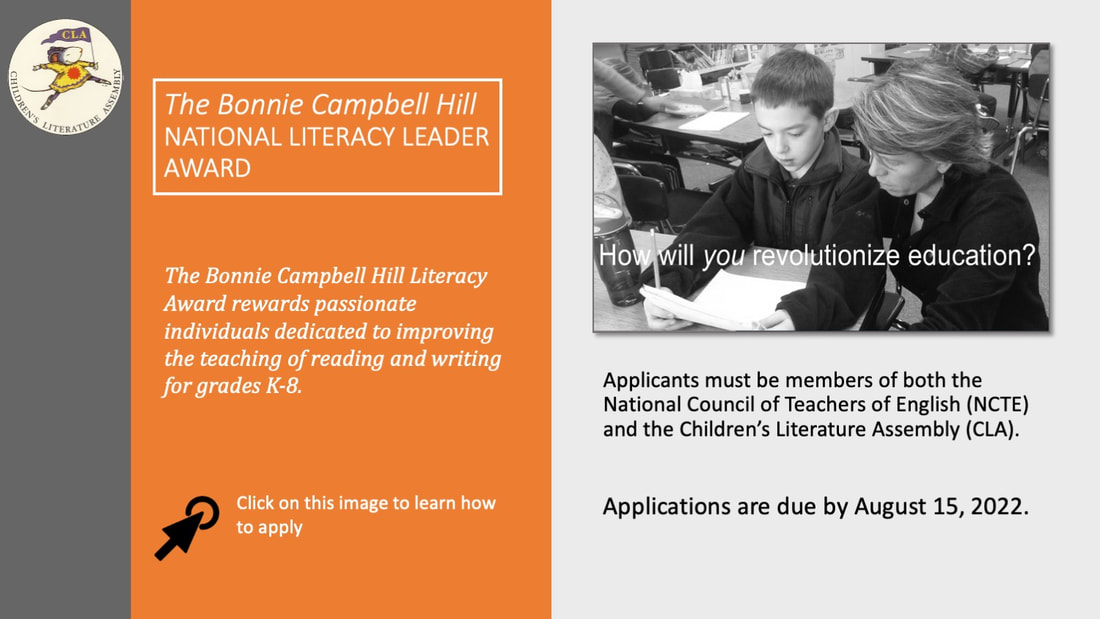
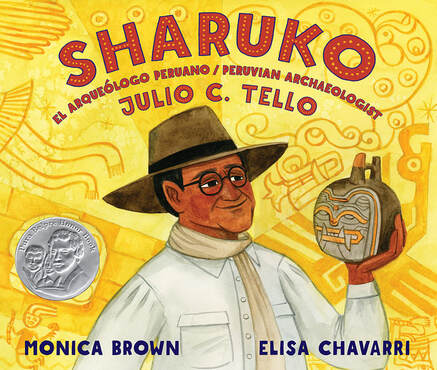
 RSS Feed
RSS Feed